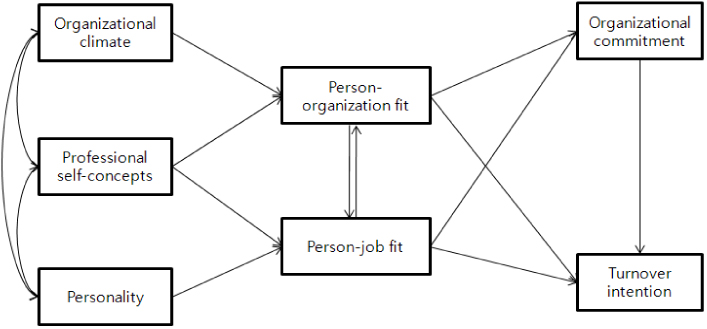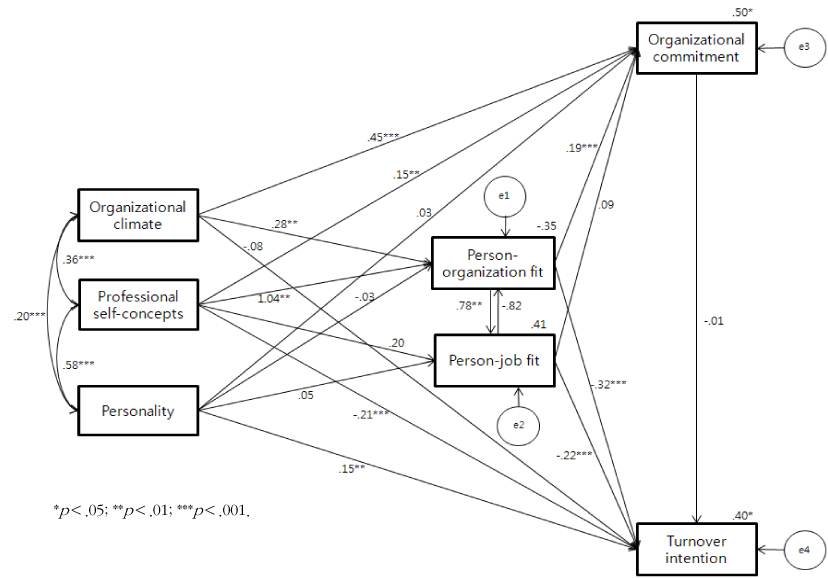J Korean Acad Nurs Adm.
2013 Jun;19(3):361-371.
Factors Affecting Organizational Commitment and Turnover Intention of Hospital Nurses: Focused on the Mediating Effects of Person-environment Fit
- Affiliations
-
- 1Department of Nursing, Kyungsung University, Korea. skill8736@hanmail.net
Abstract
- PURPOSE
This study was done to investigate the factors affecting organizational commitment and turnover intention of hospital nurses. Empirical analysis on the mediating effect of the person-environment fit of organizational commitment and turnover intention and factors affecting this relationship were also examined.
METHODS
Participants were nurses working in 4 university hospitals in Seoul or Busan. Data were collected between July 27 and Aug. 10, 2012 and for the final analysis, 393 data sets were used. The fitness of models were tested using AMOS 19.0.
RESULTS
The fitness of the modified model showed high compatibility with the empirical data. In the modified model, organizational climate, professional self-concepts and person-organization fit were found to have significant effects on hospital nurses' organizational commitment. Professional self-concepts, personality, person-organization fit and person-job fit significantly affected hospital nurses' turnover intention. There was the mediating effect of person-organization fit between organizational commitment and turnover intention and factors affecting the relationship. But person-job fit was not found to have a mediating effect. Organizational commitment accounted for 49.8% and turnover intention for 39.9% of covariance in these factors.
CONCLUSION
Nursing strategy for enhancing professional self-concepts and person-organizational fit should be planned by nursing managers.
Keyword
Figure
Reference
-
1. Allen NJ, Meyer JP. The measurement and antecedents of affective, continuance and normative commitment to the organization. J Occup Psychol. 1990. 63:1–18. http://dx.doi.org/10.1111/j.2044-8325.1990.tb00506.x.2. Arthur D. The development of an instrument for measuring the professional self-concept of nurses. 1990. Australia: University of Newcastle;Unpublished master's thesis.3. Han SS, Sohn IS, Kim NE. New nurse turnover intention and influencing factors. J Korean Acad Nurs. 2009. 39:878–887. http://dx.doi.org/10.4040/jkan.2009.39.6.878.4. Han YH, Sohn IS, Park KO, Kang KH. The relationships between professionalism, job involvement, organizational commitment and turnover intention among clinical nurses. J Korean Clin Nurs Res. 2010. 16(2):17–31.5. Hwang MH, Jeon SJ, Chung BY. A correlational study on professional self-concept and job satisfaction of clinical nurses. J Korean Community Nurs. 1998. 9:518–532.6. Iverson RD. Employee intent to stay: An empirical test of a revision of the Price and Mueller model. 1992. Cedar Falls, USA: University of Iowa;Unpublished doctoral dissertation.7. James LR, Jones AP. Organizational climate: A review of theory and research. Psychol Bull. 1974. 81:1096–1112. http://dx.doi.org/10.1037/h0037511.8. Je MJ, Kim YG. Effects of person-organization fit and person-job fit on occupational commitment, organizational commitment, and turnover intentions of cooks. Korean J Culinary Res. 2010. 16(5):50–63.9. Jeong JH, Kim JS, Kim KH. The risk factors influencing turnover intention of nurses. J Korean Acad Nurs Adm. 2008. 14:35–44.10. Jung HS. A study on the effects of employees' business ethics awareness and practice in foodservice industry upon person-organization fit, job satisfaction, turnover intent and organization performance. 2007. Seoul, Korea: Kyung Hee University;Unpublished master's thesis.11. Kang DH, Kim MK. A study on the effects of the person-environment fit on hotel employees' job satisfaction and customer orientation. Korea J Tourism Hosp Res. 2012. 26:345–360.12. Kang KN. Factors influencing turnover intention of nurses in small-medium sized hospitals. J Korean Acad Nurs Adm. 2012. 18:155–165.13. Kim CH, Yang SS, Kim YJ, Son YJ, You MA, Song JE. A structural equation model of nurses' turnover intention. J Korean Acad Nurs Adm. 2009. 15:550–562.14. Kim HO, Lee BS. The influence of nursing organizational commitment and job satisfaction on intention of resignation of clinical nurses. J Korean Acad Nurs Adm. 2001. 17:85–95.15. Kim JK, Kim MJ. A review of research on hospital nurses' turnover intention. J Korean Acad Nurs Adm. 2011. 17:538–550.16. Kim SJ. Emergent Leadership Over time. 2011. Seoul, Korea: Sookmyung Women's University;Unpublished master's thesis.17. Kim WK, Chung KH. The relationship between professional self-concept, organizational commitment and job satisfaction in clinical nurses. J Korean Acad Nurs Adm. 2008. 14:287–296.18. Kristof AL, Zimmerman RD, Johnson E. Consequences of individual's fit at work: A meta-analysis of personjob, person-organization, person-group, and person-supervisor fit. Pers Psychol. 2005. 58:281–342.19. Lawler E. Satisfaction and behavior. 1983. 7:McGraw-Hill;20–22.20. Lee MA. Effect of nurses' perception of reward and organizational commitment on their turnover intention. J Korean Acad Nurs Adm. 2009. 15:434–443.21. Moon SJ, Han SS. A predictive model on turnover intention of nurses in Korea. J Korean Acad Nurs. 2011. 41:633–641.22. Park HJ, Kim MJ, Kim YM. The effects of organizational climate of the airline cabin team, organizational commitment and organizational citizenship behavior on service performance. Korean J Tourism Res. 2009. 33:367–389.23. Park HS. Relationship between perceived nursing care role orientation, job characteristics, and turnover among nurses. 2002. Seoul, Korea: Yonsei University;Unpublished master's thesis.24. Pervin LA, John OP. Personality: Theory and research. 1997. New York, US: Guilford Press.25. Roberts BW, Robins RW. Person-environment fit and Its Implications for personality development: A longitudinal study. J Pers. 2004. 72:89–110.26. Sohng KY, Noh CH. An analytical study of the professional self-concept of hospital nurses in Korea. J Nurs Acad Soc. 1996. 26:94–106.27. Song YS, Lee MY. The effect of needs for professional development and organizational climate on organizational socialization. J Korean Clin Nurs Res. 2010. 16(3):51–61.28. Stone PW, Mooney-Kane C, Larson EL, Pastor DK, Zwanziger J, Dick AW. Nurse working conditions, organizational climate, and intent to leave in ICUs: An instrumental variable approach. Health Serv Res. 2007. 42:1085–1104. http://dx.doi.org/10.1111/j.1475-6773.2006.00651.x.29. Wright TA, Bonett DG. Job satisfaction and psychological well-being as nonadditive predictors of workplace turnover. J Manage. 2007. 33:141–160.30. Yang YJ. Hotel employees' person-environment fit influencing proactive behavior: Focused on the mediating effect of perceived organizational support. 2009. Seoul, Korea: Sejong University;Unpublished master's thesis.
- Full Text Links
- Actions
-
Cited
- CITED
-
- Close
- Share
- Similar articles
-
- Effect of Nurses’ Person-Environment Fit on Positive Psychological Capital, Career Commitment, and Turnover Intention
- Mediating Effects of Empowerment, Job Stress, and Organizational Commitment in Relation-oriented Nursing Organization Culture and Turnover Intention of Clinical Nurses
- Effects of Nurses' Social Capital on Turnover Intention: Focused on the Mediating Effects Organizational Commitment and Organizational Cynicism
- Effect of Nursing Organizational culture, Organizational Silence, and Organizational Commitment on the Intention of Retention among Nurses: Applying the PROCESS Macro Model 6
- Effects of Self-efficacy, Career Plateau, Job Embeddedness, and Organizational Commitment on the Turnover Intention of Nurses



